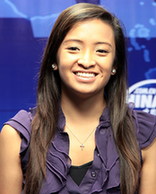Hunan Satellite Television (HST) said it will not hold popular talent shows next year after the authorities said the channel violated a broadcasting time limit for Super Girl, one of the country's most popular TV talent shows, similar to American Idol.
Since some of this year's programs exceeded the maximum duration allowed by the State Administration of Radio, Film and Television (SARFT), "we received notification from the administration that we cannot make selective TV trials with mass involvement of individuals in the year 2012", Li Hao, deputy editor-in-chief and spokesman of the channel, confirmed to China Daily on Sunday.
"Hunan Satellite Television will obey the State regulator's decision and will not hold similar talent shows next year. Instead, the channel will air programs that promote moral ethics and public safety and provide practical information for housework," Li said.
Super Girl was based on an annual national contest held by HST since May 2009. A similar TV talent show that was seen as the forerunner of Super Girl ran for five years and swept through the nation.
The episode in question aired on July 15 and lasted about 182 minutes, which is 90 minutes longer than the SARFT cap.
In 2007, SARFT took several moves to regulate talent shows, including banning TV talent shows in prime time (7:30 pm to 10:30 pm) and limiting the duration of each episode to no more than 90 minutes.
An anonymous staff member said that the ratings for the contest this year "kept being higher than other TV programs of its kind".
"For me, exceeding the time limit is just an excuse to shut down the TV program, and there would have been other excuses even if the TV station did not make the shows that long," said Jin Yong, a researcher at the Communication University of China.
"I believe the reason that forced the administration to 'regulate' this program is that some television hosts in the program made inappropriate comments and some did not dress properly," Jin said.
Under the 2007 regulations, SARFT stated that some talent show programs were "vulgar" and did not conform to the healthy and positive orientation that TV programs should have.
In 2010, SARFT published regulations on dating shows to curb media hype of money worship.
"These regulations could probably influence the shows in the short term but cannot stop them from developing, because more and more people want to escape from serious issues on TV," Jin said.
In 2007, the administration issued rules intended to uphold high moral standards during the sequel of HST's popular talent contest, Super Boy.
Super Boy, similar in format to Super Girl, was ordered to include only "healthy and ethically inspiring" songs.
The program was also told to avoid "gossip" about the contestants and not to show scenes of screaming fans or tearful losing contestants, as those were believed to be in "bad taste".
(中国日报网英语点津 Helen 编辑)

About the broadcaster:

?Christine Mallari is an intern at China Daily. She was born in Chicago, Illinois and raised in a nearby suburb before moving for college. After recently graduating from the University of Iowa with a degree in English, Journalism and Mass Communications, she moved to Beijing to work with China Daily. Though she has been working in journalism since high school, this is her first time doing so abroad.
